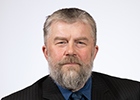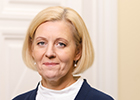2024 Report by the Minister of Education and Research on the Implementation of the State's Long-Term Development Strategy "Eesti 2035" (Education Reforms)
Session: 15th Estonian Parliament, 3rd sitting, plenary session
Date: 2024-03-05 12:11
Participating Politicians:
Total Speeches: 150
Membership: 15
Agenda Duration: 2h 55m
AI Summaries: 150/150 Speeches (100.0%)
Analysis: Structured Analysis
Politicians Speaking Time
Politicians
Analysis
Summary
The Minister of Education and Research, Kristina Kallas, presented a report to the Riigikogu (Estonian Parliament) on the implementation of the education reforms outlined in the country's long-term development strategy, "Eesti 2035." The Minister framed her presentation around three significant challenges: geopolitical confrontation, control over energy resources, and technological development, emphasizing that education is the key to Estonia's future and economic growth. She highlighted four main reforms: the decades-awaited transition to Estonian-language education, the extension of compulsory education until the age of 18, the vocational education reform, and the reorganization of the school network aimed at creating strong post-basic education centers.
The discussion largely focused on the teacher succession crisis, with the Minister admitting that the language proficiency of 1,800 teachers does not meet expectations and that the balance between salary and workload is skewed. The issue of boys dropping out after basic school and the future of the school network in rural areas were also addressed. The Minister stressed that the goal of reorganizing the school network is not to close schools, but to ensure high-quality upper secondary education for rural youth by offering a wider choice through applied upper secondary schools and vocational education. She expressed hope for concluding a long-term education agreement that would bring stability to teachers' working conditions.
Decisions Made 1
Following the conclusion of the debate on this agenda item, the Riigikogu did not adopt a decision. Representatives of the factions held negotiations.
Most Active Speaker
The most active member of the Riigikogu, who participated both in question time and in the faction speech, was Vadim Belobrovtsev, representative of the Centre Party faction. As an opposition politician, he expressed deep skepticism regarding the government's education strategy. He praised the minister for initiating reforms but sharply criticized the lack of concrete solutions to the system's most acute problems, such as the massive teacher shortage and the deficit of support specialists. Belobrovtsev emphasized that parents of children with special educational needs are uninformed about the transition to Estonian-language instruction. He also criticized the education system for not being in sync with the changing economic system, which exacerbates the labor shortage. In his view, the ministry lacks a long-term and comprehensive strategy for resolving these crises.
Aseesimees Toomas Kivimägi
AI Summary
The Riigikogu now moves to the second item on the agenda, which involves discussing the 2024 report by the Minister of Education and Research regarding the implementation of the state's long-term development strategy, "Eesti 2035," within the context of education reforms. The procedure for handling this item is explained: there will be up to a 20-minute presentation, followed by oral questions and negotiations between the parliamentary factions, at the conclusion of which no decision will be taken. The honorable Minister Kristina Kallas is now invited to the podium.
Haridus- ja teadusminister Kristina Kallas
AI Summary
Minister of Education and Research Kristina Kallas stated that Estonia’s future hinges on three key areas—defense, energy, and education. She plans to complete the transition to Estonian-language education, strengthen vocational and higher education, and establish at least 100 robust educational centers by 2035 to ensure technological advancement, innovation, and national prosperity and economic growth.
Aseesimees Toomas Kivimägi
AI Summary
Deputy Speaker Toomas Kivimägi asks the esteemed Minister whether he needs more time.
Haridus- ja teadusminister Kristina Kallas
AI Summary
The Minister of Education and Research, Kristina Kallas, said that she wants more time.
Aseesimees Toomas Kivimägi
AI Summary
Deputy Chairman Toomas Kivimägi said that the presentation length is three to five minutes.
Haridus- ja teadusminister Kristina Kallas
AI Summary
Minister of Education and Research Kristina Kallas set the duration of the address at five minutes.
Aseesimees Toomas Kivimägi
AI Summary
Deputy Speaker Toomas Kivimägi requests five more minutes.
Haridus- ja teadusminister Kristina Kallas
AI Summary
Minister of Education and Research Kristina Kallas stated that research and development (R&D) is the key to Estonia’s economy and innovation, and to advance it, we must wisely invest in higher education and science, and, with the involvement of all stakeholders, formulate and implement an education agreement, focusing on teachers’ working conditions, workload, and compensation.
Aseesimees Toomas Kivimägi
AI Summary
Deputy Speaker Toomas Kivimägi offered his thanks and noted that the large volume of questions demonstrated the relevance of the topic, before inviting Tanel Kiik to begin. However, the microphone was not working, and he could not be heard.

Tanel Kiik
Profiling Fraktsiooni mittekuuluvad Riigikogu liikmedAI Summary
Tanel Kiik is testing the microphone, tapping on it and asking if it isn't working.
Aseesimees Toomas Kivimägi
AI Summary
The speech urges the audience to try again and not give up.

Tanel Kiik
Profiling Fraktsiooni mittekuuluvad Riigikogu liikmedAI Summary
Tanel Kiik says he doesn't have a single button to push.
Haridus- ja teadusminister Kristina Kallas
AI Summary
Minister of Education and Research Kristina Kallas confirms that it is now working.
Aseesimees Toomas Kivimägi
AI Summary
Deputy Speaker Toomas Kivimägi announces that the microphone is working, and invites Tanel Kiik to speak.

Tanel Kiik
Profiling Fraktsiooni mittekuuluvad Riigikogu liikmedAI Summary
In the context of Equal Pay Day, Tanel Kiik asks what steps the Minister of Education plans to take to reduce gender inequality and the wage gap in the education sector, as well as to change societal values.
Haridus- ja teadusminister Kristina Kallas
AI Summary
Kristina Kallas acknowledged that the gender pay gap and educational inequality in Estonia are serious issues, because the proportion of men among teachers is small and the salary is uncompetitive. The educational gap between boys and girls is growing (out of 1,200 basic school graduates, 99.8% are boys), and women make up over 65% of those in higher education. She aims to reduce this by extending the school age, thereby raising the educational attainment of boys to the level of girls.
Aseesimees Toomas Kivimägi
AI Summary
Deputy Chairman Toomas Kivimägi asks Rene Kokk to repeat the question, as he himself cannot hear well, and notes that the microphone is now on.
AI Summary
Rene Kokk expressed concern that services and the school network are shifting from rural areas to major centers, noting that life in the countryside is becoming progressively harder for rural residents due to school closures and limited public transportation. He then asked what real, positive steps are planned for local governments to take to preserve schools and ensure people can continue living in rural areas.
Haridus- ja teadusminister Kristina Kallas
AI Summary
Rural youth must have access to quality education following basic school. To ensure this, we need to maintain local basic schools with at least six grades and develop strong educational hubs in rural areas. These hubs must provide options for general secondary education (gymnasium), applied secondary education, or vocational training. Crucially, the state must cover the transport, catering, and housing costs for the students at these schools so that everyone, regardless of their socio-economic background, can access quality education and the possibility of future university studies.
Aseesimees Toomas Kivimägi
AI Summary
The speech includes an invitation for Margit Sutrop to speak.

Margit Sutrop
Profiling Eesti Reformierakonna fraktsioonAI Summary
The issue of boys dropping out of education will not be solved merely by extending the study period, because the lack of mathematical aptitude and the catastrophic state of math teachers’ qualifications—for example, 313 teachers have only secondary education, 5 have only basic education, and 720 have a bachelor’s or applied higher education degree—require serious correction.
Aseesimees Toomas Kivimägi
AI Summary
Toomas Kivimägi, the Deputy Chairman, thanks the audience and remarks that it is time to move forward.

Margit Sutrop
Profiling Eesti Reformierakonna fraktsioonAI Summary
Margit Sutrop asks what could be done to increase the number of mathematics teachers.
Aseesimees Toomas Kivimägi
AI Summary
Deputy Speaker Toomas Kivimägi thanks the audience.

Margit Sutrop
Profiling Eesti Reformierakonna fraktsioonAI Summary
He stresses that this subject is not intended for extended study periods, but is specifically meant for basic and middle school levels.
Haridus- ja teadusminister Kristina Kallas
AI Summary
Kristina Kallas emphasized that the decline in academic engagement among youth, particularly boys, primarily stems from a decrease in motivation during the third stage of basic school (grades 7–9). To solve this, it is necessary to improve the organization of studies and teaching methods for grades 7–9, increase career counseling, and diversify formal education by incorporating elements of non-formal learning. Simultaneously, we must resolve the crisis concerning mathematics and natural science teachers and address the issue of salary conditions, ensuring that there are sufficient qualified educators in both urban and rural areas.
Aseesimees Toomas Kivimägi
AI Summary
He asks Urmas Kruuse to take the floor.

Urmas Kruuse
Profiling Eesti Reformierakonna fraktsioonAI Summary
Urmas Kruuse continues the previous question, asking what the analyses reveal about the impact of extending the school period: specifically, whether the causal factors are primarily academic or emotional, what the studies indicate, and whether the goal is to reduce the dropout rate to zero, rather than merely fulfilling a state obligation.
Haridus- ja teadusminister Kristina Kallas
AI Summary
Minister Kristina Kallas emphasized that while the problem cannot be entirely eliminated, it is necessary to create additional places for vocational skills development and a preparatory study year, and to focus on establishing alternative learning opportunities and supplementary Estonian language instruction. This is to ensure that young people with special needs, health issues, and Russian-speaking backgrounds do not drop out of the education system after basic education, but are instead able to continue their studies in vocational education or through other suitable avenues.
Aseesimees Toomas Kivimägi
AI Summary
Deputy Speaker Toomas Kivimägi calls Signe Kivi.

Signe Kivi
Profiling Eesti Reformierakonna fraktsioonAI Summary
Signe Kivi emphasizes that Estonia allocates 14.3% of the state budget to education (2021) and asks whether making school attendance compulsory from the age of six could be part of the education reform, given that children are eager to go to school and their potential becomes evident early on.
Haridus- ja teadusminister Kristina Kallas
AI Summary
Minister of Education and Research Kristina Kallas stressed that early childhood education in Estonia is very strong. Although there is discussion about shifting the start date of the school year, Estonia's academic year is the shortest in the European Union. This places a greater burden on teachers, students, and parents, because our curriculum is more ambitious.
Aseesimees Toomas Kivimägi
AI Summary
Deputy Chairman Toomas Kivimägi remarked jokingly that maybe our children are more gifted, and that’s why we could start later.

Anti Allas
Profiling Fraktsiooni mittekuuluvad Riigikogu liikmedAI Summary
Anti Allas stresses that, regarding the education network reform, school closures should not be handled purely quantitatively, relying on Excel spreadsheets. Instead, the focus must shift to a qualitative, case-by-case, and community-inclusive reform aimed at preventing the destruction of small regions, offering conditional support, and allowing communities the chance to find their own niche.
Haridus- ja teadusminister Kristina Kallas
AI Summary
Kristina Kallas stated that the reorganization of the school network will focus on qualitative and case-by-case management. Furthermore, via proposals sent to local governments, the school network will be regionally reviewed over a 5–10 year perspective to ensure high-quality post-basic education, rather than focusing on school closures. Decisions will be made on a case-by-case basis, taking into account the teacher pipeline, student numbers, and the availability of alternatives in the region.
Aseesimees Toomas Kivimägi
AI Summary
Deputy Chairman Toomas Kivimägi requests that Rain Epler finally be allowed to ask his question.

Rain Epler
Profiling Fraktsiooni mittekuuluvad Riigikogu liikmedAI Summary
Rain Epler notes that although the government is doing good things, the media tends to spread negative narratives. He then asks about the geographical distribution of the 100 post-basic school education centers across Tallinn, Tartu, and the rest of Estonia, taking population density into account. Simultaneously, he emphasizes that while investments in education are significant, attention must be paid to the substantive balancing of the facilities and the continuous renewal of the infrastructure.
Aseesimees Toomas Kivimägi
AI Summary
Deputy Speaker Toomas Kivimägi thanks the audience.

Rain Epler
Profiling Fraktsiooni mittekuuluvad Riigikogu liikmedAI Summary
Rain Epler is asking how our plan is progressing.
Haridus- ja teadusminister Kristina Kallas
AI Summary
Kristina Kallas stated that by 2035, the gymnasiums and vocational education centers in Tallinn and Tartu will maintain their current capacity. Alongside the state gymnasium planned for Lasnamäe, the rest of Estonia will compete by developing strong post-basic education centers, and the overall accessibility of education will improve. However, a large portion of the investments comes from European Union funds, whose 6% share covers infrastructure, and the loss of which would significantly reduce the state budget contribution to education and science.
Aseesimees Toomas Kivimägi
AI Summary
Vice-Chairman Toomas Kivimägi invited Urve Tiidus to speak.

Urve Tiidus
Profiling Eesti Reformierakonna fraktsioonAI Summary
Urve Tiidus notes that six important reforms can be identified among the education sector reforms, and she asks the minister which reform he is most optimistic about and what concerns her the most regarding its successful implementation.
Haridus- ja teadusminister Kristina Kallas
AI Summary
I very strongly believe in the transition to Estonian-language instruction and consider it unavoidable that we do not take a step back, but instead continue with reforms, especially through making vocational education more attractive and extending the compulsory education requirement, so that basic school graduates and boys continue their education and men's health does not deteriorate.
Aseesimees Toomas Kivimägi
AI Summary
Deputy Chairman Toomas Kivimägi addresses Mario Kadastik and asks him to speak.

Mario Kadastik
Profiling Fraktsiooni mittekuuluvad Riigikogu liikmedAI Summary
Mario Kadastik asks whether the education reform will focus more attention on innovative and self-directed young people, provide broader support for teaching methodologies—including making Montessori primary and basic education more accessible—and whether the restrictive mathematics exam system will finally be abolished.
Haridus- ja teadusminister Kristina Kallas
AI Summary
Kristina Kallas said that she is not planning a rapid update of the curricula, and the first proposal for the new curriculum will be ready in 2027. The development will take place with the support of the European Union, but the implementation of the modern learning approach has already been underway in schools for about ten years and focuses on the student's learning process. At the same time, progress is slower in Russian-language schools, requiring teachers' self-reflection and continuous methodological change.
Aseesimees Toomas Kivimägi
AI Summary
Vice-Speaker Toomas Kivimägi invited Helmen Kütt to take the floor.
Haridus- ja teadusminister Kristina Kallas
AI Summary
Minister of Education and Research Kristina Kallas said that the problem isn't changing the exam itself, but rather the limited availability of advanced mathematics options and the lack of confidence students acquire during basic school. Consequently, we need to strengthen the instruction of natural and exact sciences in basic school and promote the selection of advanced mathematics to enable more personalized learning paths for students.
Aseesimees Toomas Kivimägi
AI Summary
Deputy Chairman Toomas Kivimägi invites Helmen Kütt to speak.

Helmen Kütt
Profiling Sotsiaaldemokraatliku Erakonna fraktsioonAI Summary
Helmen Kütt raised the issue of inclusive education, emphasizing that while it is suitable for many children with special needs, there are also those for whom it is not appropriate and who might develop mental health problems. She then asked whether any analyses or studies have been conducted to evaluate its suitability and the current resource situation.
Aseesimees Toomas Kivimägi
AI Summary
Toomas Kivimägi expresses his thanks.
Haridus- ja teadusminister Kristina Kallas
AI Summary
Kallas said that the results of the study on the functioning and effectiveness of inclusive education are expected from Tallinn University at the end of April or the beginning of May, and the relevance of these results and the methods to be implemented is critical to ensuring a better learning path for children.
Aseesimees Toomas Kivimägi
AI Summary
Pipi-Liis Siemann is invited to speak.

Pipi-Liis Siemann
Profiling Fraktsiooni mittekuuluvad Riigikogu liikmedAI Summary
Pipi-Liis Siemann asks whether investment subsidies for streamlining the school network and replacing aging infrastructure could be linked to climate goals, thereby simultaneously improving learning conditions and achieving economic savings in the future.
Haridus- ja teadusminister Kristina Kallas
AI Summary
Minister of Education and Research Kristina Kallas announced that with the support of European Union funds, the reorganization of the Ida-Viru County school network will take place in the municipalities of Kohtla-Järve, Narva, Toila, and Alutaguse. Within this framework, energy-efficient school buildings will be constructed and the number of basic schools will be reduced. The volume of investments will reach approximately 70 million euros over the next five years. Discussions are being held with 14 local governments regarding the creation of education centers and the restructuring of the school network at the gymnasium level. Infrastructure needs and the use of CO2 funds as a priority will be mapped, and the standard investment volume for kindergartens will be developed.
Aseesimees Toomas Kivimägi
AI Summary
This address is merely a request to invite Mait Klaassen to speak.

Mait Klaassen
Profiling Eesti Reformierakonna fraktsioonAI Summary
Mait Klaassen asks whether current investment decisions will still be valid 20–30 years from now, and whether there is a baseline study that takes into account population redistribution and the needs of future economically developing regions, or if decisions are being made purely empirically.
Haridus- ja teadusminister Kristina Kallas
AI Summary
Minister of Education and Research Kristina Kallas stated that decisions regarding the school network are not based on wish lists, but rather rely on long-term demographic and internal migration trends, as well as forecasts from the internal migration calculator compiled by the University of Tartu. She added that although the population has relocated significantly over the past few decades, the majority of settlement patterns will remain consistent over the next 10 to 15 years. Therefore, the school network must be restructured, focusing on the quality of children’s education and the rational use of facilities, including in rural areas.
Aseesimees Toomas Kivimägi
AI Summary
The address is a call to summon Kristina Šmigun-Vähi to the stage.

Kristina Šmigun-Vähi
Profiling Eesti Reformierakonna fraktsioonAI Summary
Kristina Šmigun-Vähi put forward the idea that schools should teach a sense of responsibility, ensuring every child understands that what they are learning is ultimately for their own benefit, and that proficiency in the Estonian language will be crucial for obtaining a good education in the future.
Haridus- ja teadusminister Kristina Kallas
AI Summary
Minister of Education and Research Kristina Kallas notes that although the national examination system has received criticism, it instills a sense of responsibility in children. Furthermore, responsibility is divided among parents, the community, and the school, even though a teacher cannot be responsible for all aspects of a child's life, and children's responsibility is generally well established in Estonia.
Aseesimees Toomas Kivimägi
AI Summary
Deputy Speaker Toomas Kivimägi invites Helle-Moonika Helme to speak.

Helle-Moonika Helme
Profiling Eesti Konservatiivse Rahvaerakonna fraktsioonAI Summary
Helle-Moonika Helme questions the development strategy, asking whether the closure of rural schools and urbanization truly solve problems. She highlights that improving the standard of rural schools is necessary, noting that the victory of a student from Metsküla School confirms the opposite, and calls for investment in rural education and for discussing the future of schools together with local governments, rather than taking steps that would create problems through the taxation of older cars.
Aseesimees Toomas Kivimägi
AI Summary
Toomas Kivimägi thanks.

Helle-Moonika Helme
Profiling Eesti Konservatiivse Rahvaerakonna fraktsioonAI Summary
We are discussing how to ensure quality education for children even fifty years from now.
Aseesimees Toomas Kivimägi
AI Summary
Toomas Kivimägi thanks Helle-Moonika.

Helle-Moonika Helme
Profiling Eesti Konservatiivse Rahvaerakonna fraktsioonAI Summary
He asks if it is actually a verbal magic trick.
Haridus- ja teadusminister Kristina Kallas
AI Summary
Minister of Education and Research Kristina Kallas emphasizes that the school network reform has been started from the wrong end—closing small schools does not improve the quality or accessibility of education. Instead, the problem lies at the upper secondary level, where many young people lack the necessary teaching staff required for further studies, and the state must guarantee their learning opportunities.
Aseesimees Toomas Kivimägi
AI Summary
Deputy Chairman Toomas Kivimägi calls upon Meelis Kiili to speak.

Meelis Kiili
Profiling Fraktsiooni mittekuuluvad Riigikogu liikmedAI Summary
Education is the guarantee of our future and is the shared responsibility of the state and local municipalities. Although the state has established a support measure for primary schools, there are fears of misuse by some local governments, where functioning basic schools are sought to be converted into primary schools simply to receive extra funding. The question is being raised whether measures have been devised to prevent this kind of abuse.
Aseesimees Toomas Kivimägi
AI Summary
Deputy Chairman Toomas Kivimägi thanks the audience.
Haridus- ja teadusminister Kristina Kallas
AI Summary
The support mechanism, which was intended to achieve a specific objective, has begun influencing decisions that do not align with that objective. Since this is its first implementation, a review will be carried out at the end of the year, and adjustments will be made if necessary.
Aseesimees Toomas Kivimägi
AI Summary
Deputy Speaker Toomas Kivimägi invites Anti Poolamets to take the floor.

Anti Poolamets
Profiling Eesti Konservatiivse Rahvaerakonna fraktsioonAI Summary
Anti Poolamets voices criticism concerning the tax system and also expresses concern about the preservation of the language and culture of refugees arriving because of the war in Ukraine. He laments that many of them are being placed in Russian schools, and that their ability to speak Ukrainian and their opportunity to study in Ukrainian may be lost, even though they are only temporary guests here.
Haridus- ja teadusminister Kristina Kallas
AI Summary
Minister of Education and Research Kristina Kallas stated that over 80% of Ukrainian children in Estonia attend Estonian-language schools, that the choice of school remains with the parent, not the state or local governments, and that the transition to Estonian-language instruction will begin on September 1st without exceptions, meaning all Ukrainian children currently studying in Russian-language schools will switch to Estonian-language instruction, even though 20% of Ukrainian parents have preferred Russian-language schools.
Aseesimees Toomas Kivimägi
AI Summary
Deputy Chairman Toomas Kivimägi asked Kersti Sarapuu to come forward.

Kersti Sarapuu
Profiling Fraktsiooni mittekuuluvad Riigikogu liikmedAI Summary
The speech emphasizes the scarcity of engineering and technical experts, and raises the question of what measures are ready to be tested or implemented to motivate young people to choose engineering fields and reduce student attrition from university.
Haridus- ja teadusminister Kristina Kallas
AI Summary
Minister of Education and Research Kristina Kallas announced that 60 million euros in European Union funding will be channeled into STEM development—this includes adding engineering electives in upper secondary schools, creating new curricula in vocational education, and boosting support for teachers and students in higher education. The goal is to increase the capacity for skills and research and development (R&D), and to foster an interest in technology among young people at an earlier stage through hobby education for both boys and girls.
Aseesimees Toomas Kivimägi
AI Summary
Deputy Speaker Toomas Kivimägi called upon Jaak Aab to speak.
AI Summary
Jaak Aab stressed the need to reform vocational education, compared the situation in Estonia to that of Finland, and discussed how new curricula and incentives—the so-called 'carrots and sticks'—could clarify the choice of vocational school for both parents and young people.
Haridus- ja teadusminister Kristina Kallas
AI Summary
The presentation stresses that, in order to increase the attractiveness of vocational education, basic school graduates must be offered more choices and it must be ensured that vocational education is not a dead end, but rather opens a path to higher education institutions through an applied gymnasium, as demonstrated by the Finnish model, where applied education is attractive and leads young people to university or a polytechnic.
Aseesimees Toomas Kivimägi
AI Summary
Deputy Speaker Toomas Kivimägi calls upon Liina Kersna to take the floor.

Liina Kersna
Profiling Eesti Reformierakonna fraktsioonAI Summary
Liina Kersna emphasizes that six education reforms must be implemented in cooperation with representative organizations in the education sector, and asks how much consultation has taken place with school psychologists and child protection specialists regarding the extension of the compulsory education age, stressing that approximately 700 young people per year fall within their purview.
Haridus- ja teadusminister Kristina Kallas
AI Summary
Kristina Kallas stated that the number of such individuals among NEET youth is very small, and the underlying reasons are diverse, including the lack of Estonian language proficiency. She added that the reform extending the compulsory schooling age has broadly involved local municipalities and support specialists, and the draft bill is currently in the consultation phase. Further discussion and the growing need for support services, particularly for school psychologists, will continue.
Aseesimees Toomas Kivimägi
AI Summary
Deputy Chairman Toomas Kivimägi invites Annely Akkermann to the stage.

Annely Akkermann
Profiling Eesti Reformierakonna fraktsioonAI Summary
Annely Akkermann thanks the Chair and the Minister and discusses the comparison of education costs with EU subsidies, noting that the European taxpayer and the Estonian taxpayer pay the same amount. She then raises a question concerning the academic underperformance of boys, the necessity of extending the duration of compulsory schooling, and the required opportunity to teach boys using different methods.
Haridus- ja teadusminister Kristina Kallas
AI Summary
Boys are failing to continue their basic education because of a decline in learning skills and motivation, and subsequent dropout, which typically occurs during the third stage of schooling. Consequently, it is essential to strengthen the counseling system at this third stage of basic school and integrate non-formal education into the formal curriculum, ensuring that children gain a better understanding of their strengths and their future educational goals.

Evelin Poolamets
Profiling Fraktsiooni mittekuuluvad Riigikogu liikmedAI Summary
Evelin Poolamets highlighted that there are over 18,000 young people aged 15 to 26 in Estonia who neither work nor study. She noted that the greatest risk is among those who have completed basic school and those who have dropped out of two educational levels, and that changing schools exacerbates these figures. She then asked whether the ongoing education reform will increase these numbers and what measures are planned to alleviate the situation.
Aseesimees Toomas Kivimägi
AI Summary
Toomas Kivimägi asks Evelin Poolamets to come.
Haridus- ja teadusminister Kristina Kallas
AI Summary
Kristina Kallas said that 18,000 young people up to the age of 24 who are neither studying nor working are in that situation not necessarily due to insufficient education, but rather because of the limited learning opportunities and strictly defined educational pathways within the current system. Therefore, a vocational education reform is being launched to offer young people a broader and more personalized approach to learning, as well as the opportunity to acquire both a vocational qualification and a secondary education.

Priit Sibul
Profiling Isamaa fraktsioonAI Summary
Priit Sibul is asking about the transition to Estonian-language education. At the same time, he addresses the allegation regarding the transfer of supplementary pay to teachers teaching in Estonian in Ida-Virumaa, requesting that this claim be refuted. Furthermore, he wishes to know how many resources the Ministry of Education and Research utilizes for locating missing students, and what problem the extension of the compulsory education obligation to age 18 actually solves.
Aseesimees Toomas Kivimägi
AI Summary
Deputy Speaker Toomas Kivimägi invites Priit Sibul to the stage.
Haridus- ja teadusminister Kristina Kallas
AI Summary
Minister Kristina Kallas noted that the data available regarding the payment of teachers' supplementary fees is incomplete and the procedure is slow. She also emphasized the important role of NEET youth coordinators. Furthermore, the goal of extending compulsory education is to reach 16-year-olds to ensure they continue their educational path.
Aseesimees Toomas Kivimägi
AI Summary
Deputy Speaker Toomas Kivimägi invites Varro Vooglaid to take the floor.

Varro Vooglaid
Profiling Fraktsiooni mittekuuluvad Riigikogu liikmedAI Summary
Vooglaid cites Martin Ehala’s calculations, which indicate that closing rural schools would result in a school commute of approximately two hours, an annual burden of 350 hours, and a cost of around 2,200 euros per student. Furthermore, this would impact roughly 1,800 children living in the countryside and shift an annual cost of nearly 4 million euros onto rural families. He then questions how such unequal treatment can possibly be justified.
Haridus- ja teadusminister Kristina Kallas
AI Summary
Kristina Kallas said that she does not plan to close all gymnasiums with fewer than 100 students. Instead, she will cooperate with local municipalities and, over the next 5 to 10 years, ensure high-quality secondary education, including an engineering studies module that requires a minimum of 40 students. Furthermore, she aims to reduce regional inequality and, where necessary, provide support for long school commutes.
Aseesimees Toomas Kivimägi
AI Summary
Deputy Chairman Toomas Kivimägi invited Vadim Belobrovtsev to speak.

Vadim Belobrovtsev
Profiling Eesti Keskerakonna fraktsioonAI Summary
The presentation was detailed, but the two reforms were only briefly touched upon. He/She highlighted the ongoing struggle against the legacy of the Soviet Union and posed two pressing questions: where will the pipeline of new teachers come from, and where can we find support specialists for students with special needs.
Haridus- ja teadusminister Kristina Kallas
AI Summary
Minister of Education and Research Kristina Kallas stressed that Estonia has integrated the Russian-language education system established during the Soviet era over the past 30 years. The final steps must now be concluded, with primary attention directed toward teacher succession, working conditions, workload, and establishing a framework for long-term salary and collective agreements that will ensure the teaching profession is both sustainable and attractive.
Aseesimees Toomas Kivimägi
AI Summary
Deputy Chairman Toomas Kivimägi invites Andrus Seeme to take the floor.

Andrus Seeme
Profiling Eesti Reformierakonna fraktsioonAI Summary
Andrus Seeme asked the minister for clarification regarding the establishment of county-level education centers, and inquired what school stages they might include and how the initiative would be funded.
Haridus- ja teadusminister Kristina Kallas
AI Summary
Over the next five years, vocational education centers should expand into comprehensive education centers, where, in addition to vocational training, they will offer full-time and applied upper secondary education, a preparatory study year, workplace-based curricula in cooperation with companies, and various learning methods, thereby increasing the role of regional entrepreneurs and opening up wider learning opportunities for both young people and adults.
Aseesimees Toomas Kivimägi
AI Summary
Toomas Kivimägi thanks the minister for the precise answers and thorough knowledge, notes the upcoming change of chairman, and, stating that they will now proceed, invites Hanah Laht to speak.

Hanah Lahe
Profiling Fraktsiooni mittekuuluvad Riigikogu liikmedAI Summary
Hanah Lahe emphasized that young people should receive quality, integrated, and comprehensive environmental education at all school levels, and referred to the coalition agreement, which promises its promotion.
Haridus- ja teadusminister Kristina Kallas
AI Summary
Kristina Kallas stated that the curriculum changes implemented last year shift the focus in subjects to learning outcomes and the resulting skills. These skills encompass the modern economy, society, and environmental and climate issues. Teachers are concentrating on achieving these outcomes, while schools are updating their subject curricula in line with the new national curricula. Furthermore, in collaboration with schools, they will assess how widely environmental topics are being integrated.
Aseesimees Jüri Ratas
AI Summary
Deputy Speaker Jüri Ratas invites Andres Sutt to speak.
Andres Sutt
AI Summary
Andres Sutt asks how well the Estonian education system, teachers, and students are prepared for the changes brought about by the rapid development of technology and the widespread adoption of artificial intelligence.
Haridus- ja teadusminister Kristina Kallas
AI Summary
Kristina Kallas stated that the digital competence of Estonian teachers is relatively good; we have a digital competence compass and tools for development. However, the next step is integrating artificial intelligence into schools, and the council recommended solving learning tasks using AI. This requires reviewing the teaching process and launching implementation projects, although the planned three million euros unfortunately ended up going towards teachers' salaries.
Aseesimees Jüri Ratas
AI Summary
Dear colleagues, thank you. We will continue with Tuesday's sitting, and we are capable of managing this Riigikogu session without the help of artificial intelligence.

Aleksei Jevgrafov
Profiling Fraktsiooni mittekuuluvad Riigikogu liikmedAI Summary
The Narva City Council decided in January to submit two applications to the ministry, requesting that partial Russian-language instruction be made available for children with special needs in special classes, kindergartens, and primary schools. Jevgrafov is now asking whether the authority correctly understood the subject matter of these applications, or if it was a misunderstanding or a deliberate misrepresentation.
Aseesimees Jüri Ratas
AI Summary
Deputy Speaker Jüri Ratas acknowledges the questioner and says that it is now the questioner's time.

Aleksei Jevgrafov
Profiling Fraktsiooni mittekuuluvad Riigikogu liikmedAI Summary
This is a signal to the entire Estonian nation that Narva is resisting the law.
Haridus- ja teadusminister Kristina Kallas
AI Summary
Kristina Kallas stated that Narva's request is based on extending the transition period class by class, which she finds unreasonable. She argued that every child with special needs must be assessed individually in consultation with specialists, and schools must submit a detailed action plan for the transition to Estonian-language instruction. This is necessary to ensure that children with special needs also acquire proficiency in Estonian and do not remain isolated in the Russian-language environment.
Aseesimees Jüri Ratas
AI Summary
Deputy Speaker Ratas asks for Arvo Aller to be invited to speak.

Arvo Aller
Profiling Fraktsiooni mittekuuluvad Riigikogu liikmedAI Summary
The address expresses gratitude to the Chairman, and welcomes the Board and the Minister.
Aseesimees Jüri Ratas
AI Summary
Deputy Speaker Jüri Ratas thanks you for the greetings, sends you greetings in return, and wishes you strength.

Arvo Aller
Profiling Fraktsiooni mittekuuluvad Riigikogu liikmedAI Summary
Arvo Aller's speech criticizes the delay in paying bonuses to teachers in Ida-Viru County and the repeated document audits, arguing that this is not a sustainable long-term motivation strategy. He also highlights the closures of upper secondary schools in Alutaguse, Kiviõli, and Toila, and questions the source of funding for the salary increases, specifically asking whether new taxes are planned to be introduced.
Haridus- ja teadusminister Kristina Kallas
AI Summary
Minister of Education and Research Kristina Kallas stated that a verification must be carried out regarding the applications for salary subsidies for teachers working in Estonian in Ida-Virumaa, specifically checking their compliance with the current Estonian language proficiency requirements. This check is necessary because local municipalities have hired new teachers. Although the necessity of this verification has been questioned by critics, she asked the ministry to review the system and find a solution so that teachers do not have to wait two months for their supplementary pay. Simultaneously, the state budget strategy is being debated, and a need has been identified for approximately 50 million euros annually in additional funds for teachers' salaries in the coming years.
Aseesimees Jüri Ratas
AI Summary
The Deputy Chairman called upon Siim Pohlak to speak.

Siim Pohlak
Profiling Eesti Konservatiivse Rahvaerakonna fraktsioonAI Summary
Siim Pohlak accuses the coalition, claiming that the support intended for the third school stage has turned into support for closing that stage. He references the Reform Party's policy of retreat and the avoidance of responsibility by local governments, and asks whether any genuinely positive measures for preserving the third school stage are truly forthcoming.
Aseesimees Jüri Ratas
AI Summary
Deputy Speaker Jüri Ratas addresses the questioner and announces that the floor is now theirs.

Siim Pohlak
Profiling Eesti Konservatiivse Rahvaerakonna fraktsioonAI Summary
Siim Pohlak asks what measures have been proposed to maintain the third school stage in the context of the retrenchment policy.
Haridus- ja teadusminister Kristina Kallas
AI Summary
Minister of Education and Research Kristina Kallas stated that the state funding model, which currently finances all school levels using a unified per-student rate, needs to be reviewed. She added that funding for the third school level must be increased because it represents the most expensive component, and a dedicated funding model working group is currently addressing this issue in collaboration with local municipalities.

Õnne Pillak
Profiling Eesti Reformierakonna fraktsioonAI Summary
Õnne Pillak asked whether the school start time could be moved to 9:00 AM, citing the Health Development Institute's review of children's sleep and breakfast habits. She noted that lessons in some schools already begin between 8:30 and 8:45, and that the change would allow children to sleep properly and eat breakfast.
Aseesimees Jüri Ratas
AI Summary
This is a brief address calling upon Õnne Pillak to speak.
Haridus- ja teadusminister Kristina Kallas
AI Summary
Minister of Education and Research Kristina Kallas favors school starting at nine o'clock, but emphasizes that solving teenagers' sleep problems should not fall solely on the school, and the responsibility must be shared between parents and the community.
Aseesimees Jüri Ratas
AI Summary
Jüri Ratas thanked the Minister for the answers and announced that we are opening negotiations, and invited Kadri Tali, the representative of the Eesti 200 faction, to take the floor, who requested eight minutes of additional time.

Kadri Tali
Profiling Fraktsiooni mittekuuluvad Riigikogu liikmedAI Summary
Kadri Tali emphasizes that investing in education and extending the schooling age are the foundations for the sustainability of the Estonian economy and society. She highlights that raising the attractiveness of vocational education and strengthening music instruction in early childhood education are key priorities, as is caring for teachers' working conditions and mental health alongside the need for comprehensive education system reforms. Finally, she invites everyone to participate in the Metsküla school charity concert.
Aseesimees Jüri Ratas
AI Summary
Jüri Ratas stated that the Reform Party's proposal for an extension could not be put to a vote because the Rules of Procedure and Internal Rules Act permits an extension only until 2 PM, and the necessary amendments must be handled by the faction's leadership. He then requested that the statement be put in order; following this, he welcomed Priit Sibul, the representative of the Isamaa faction.

Priit Sibul
Profiling Isamaa fraktsioonAI Summary
Priit Sibul stated that while he was initially skeptical of the Estonia 2035 discussions, the education reforms focus on a transparent school network and funding, alongside personalized solutions. These solutions are built on trusting school leaders and considering the capabilities of students, all without adding undue burden or creating new inequities.
Aseesimees Jüri Ratas
AI Summary
Jüri Ratas announced that the Reform Party faction had submitted a motion to extend today's sitting until the agenda is completed, but not past 2:00 PM, and that motion will be put to a vote.
Aseesimees Jüri Ratas
AI Summary
The proposal was adopted with 51 votes in favor, and there were no objections or abstentions; Jaak Aab, whose authorization was provided by Helmen Kütt, Deputy Chairman of the SDP faction, represents the Social Democratic Party regarding this agenda item.
AI Summary
Jaak Aab emphasized that Estonia must ensure high-quality and inclusive general education for everyone, and that achieving this requires reforms and sufficient funding, adding that a good education is an investment, not an expense.
Aseesimees Jüri Ratas
AI Summary
It's a simple offer: something is given to the listener, and they are told that it is available for them.
AI Summary
Jaak Aab emphasized that the streamlining of the school network must be implemented as a tailor-made solution based on regional needs. Schools in rural areas must continue operating. Teachers' salaries should reach 120% of the Estonian average by 2027, and to ensure quality and equality, close cooperation must be established with local municipalities, while also preserving early childhood education and instruction in music and physical movement.
Aseesimees Jüri Ratas
AI Summary
Jüri Ratas thanks Jaak Aab and everyone, and invites Liina Kersna, the representative of the Reform Party faction, to the Riigikogu rostrum.

Liina Kersna
Profiling Eesti Reformierakonna fraktsioonAI Summary
Liina Kersna stresses that reforms within the education sector must be meticulously thought through, focusing specifically on the learner and engaging all stakeholders, while strictly following change management principles to maintain public trust and guarantee long-term development.
Aseesimees Jüri Ratas
AI Summary
Deputy Speaker Jüri Ratas announces that you have an extra minute and a half.

Liina Kersna
Profiling Eesti Reformierakonna fraktsioonAI Summary
Liina Kersna emphasized that education represents an internal transformation for every learner, and that the investment of euros directed toward education creates a smarter, happier, and safer society. Furthermore, the Reform Party faction wishes the minister support and calls for inclusive, clarifying reforms so that the talents and personality of every learner can truly flourish.
Aseesimees Jüri Ratas
AI Summary
Jüri Ratas thanks the presenter and offers special thanks for the introduction, noting that this is not customary here, and invites Vadim Belobrovtsev, the representative of the Centre Party faction, to come to the speaker's stand.

Vadim Belobrovtsev
Profiling Eesti Keskerakonna fraktsioonAI Summary
Vadim Belobrovtsev praises Kristina Kallas for the reform initiative, but notes that the education system's major problems—the shortage of teachers and support specialists, increasing workload, and low salary—as well as the transition to Estonian-language instruction require a long-term plan and concrete solutions, which the government has not yet put forward.
Aseesimees Jüri Ratas
AI Summary
Deputy Speaker Jüri Ratas requests an additional three minutes.

Vadim Belobrovtsev
Profiling Eesti Keskerakonna fraktsioonAI Summary
It seems clear from the report that concrete answers have not yet been provided regarding children with special educational needs whose mother tongue is not Estonian. Furthermore, teacher burnout is a serious concern. A holistic national strategy is required that would synchronize the education system with economic development, ensure adequate numbers of necessary specialists and support staff, and link schools and employers to provide children with a modern, high-quality education.
Aseesimees Jüri Ratas
AI Summary
Ratas thanked [them] and requested that Mart Helme, the representative of the EKRE faction, be invited to the Riigikogu rostrum to speak.

Mart Helme
Profiling Eesti Konservatiivse Rahvaerakonna fraktsioonAI Summary
Mart Helme claims that there is over-centralization in education and that funds are being directed towards school renovations, rather than to children and teachers. As a result, schools vital to communities, such as Metsküla school, are being closed. Furthermore, the reforms are 'silo reforms,' not systemic ones, because the foundation is flawed.
Aseesimees Jüri Ratas
AI Summary
Deputy Speaker Jüri Ratas asks whether to take two minutes of extra time.

Mart Helme
Profiling Eesti Konservatiivse Rahvaerakonna fraktsioonAI Summary
Mart Helme asks for three minutes, if you would kindly grant them.
Aseesimees Jüri Ratas
AI Summary
Deputy Chairman Jüri Ratas confirms that he is always ready to help.

Mart Helme
Profiling Eesti Konservatiivse Rahvaerakonna fraktsioonAI Summary
Mart Helme stated that although some consensus has emerged, the Estonian education system is in crisis: teachers are reaching retirement age and leaving, rural schools are being closed, and the ideological experimentation with inclusive and Estonian-language education is deepening the situation. Therefore, rural schools must be kept operational and ideological experimentation must be stopped in order to react to reality.
Aseesimees Jüri Ratas
AI Summary
Jüri Ratas announced that only representatives of the factions were permitted to give speeches, and since the round of speeches had concluded, the discussions and the consideration of the second agenda item were therefore closed. He then thanked Kristina Kallas and all participants.

